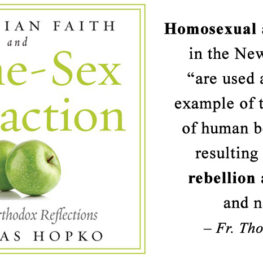Free Congress Foundation Paul Weyrich December 9, 2005
The scene was at All Saints Episcopal Church in Pasadena, California on the Sunday before the Presidential election. Reverend George F. Regas preached a sermon entitled, “If Jesus debated Senator Kerry and President Bush.” Father Regas, it would seem, gave the debate to Senator John F. Kerry (D-MA) because in that priest’s view Kerry’s views were more in line with those of Jesus Christ than were those of the President.
Someone complained to the Internal Revenue Service (IRS) and the IRS has threatened to take away the tax- exempt status of All Saints based upon that sermon. The Internal Revenue code states that section 50l(c)(3) organizations (such as a church) are “prohibited from participating or intervening in any political campaign on behalf of, or opposition to, any candidate.”
After years of ignoring blatantly partisan sermons by the Reverend Jesse L. Jackson, Sr. and the Reverend Al Sharpton and their followers (both men having run for President) in independent and Black Baptist Churches all over America, and after ignoring collections taken up in Greek Orthodox Churches on behalf of Presidential candidate Michael S. Dukakis, IRS is targetting religion over a single sermon which began with a partisan disclaimer on a single Sunday.
All Saints’ Rector, Reverend J. Edward Bacon, put it this way: “If the IRS interpretation stands, that means that a preacher cannot speak boldly about the core values about his or her faith community without fear of government recrimination.” Well put.
If, upon hearing about this case, you think that IRS should crack down on these liberal churches, think again. IRS traditionally has recognized churches as being off limits. The IRS position has included churches in which the civil rights movement, under the tutelage of the Reverend Martin Luther King, Jr., gained legitimacy. Yes, churches in this country have a long political tradition – the Revolution, the abolitionist movement, the Anti-Viet Nam War movement. Likewise, the long-sought reaction to decades of liberalism which brought about groups, such as the Moral Majority and Christian Coalition, began in the churches.
I believe IRS deliberately chose this liberal church to begin an unprecedented investigation of the content of a sermon because IRS expected conservatives silently or overtly to applaud so that when the investigations begin of conservative churches we could have little about which to complain. Yes, IRS did close a fundamentalist Indianapolis church some years back but that was for a different reason refusal to pay payroll taxes. The church had many opportunities to change its policy. It refused. IRS moved in. Since most churches have employees for whom they pay payroll taxes there was little protest, and probably no basis for protest, over that IRS action.
The IRS proceeding against All Saints is different. Father Bacon stated in a Fox News interview, “The IRS is arguing that they can investigate a church based on a field officer’s subjective determination that a preacher’s sermon implicitly opposes or endorses candidates, regardless of the explicit statements of the preacher.”
I know of many churches throughout the nation which were involved in the marriage issue on State ballots during the 2004 and 2005 elections. Black support for President Bush was highest in Ohio because one Presidential candidate supported the proposed Ohio marriage amendment while the other candidate opposed it. The difference between the two candidates was announced in the Ohio churches. No preacher of whom I am aware told his congregation how to vote in light of support for or opposition to a marriage amendment.
Many Roman Catholic and Eastern Orthodox Churches discussed on the Sunday before the election the difference on abortion between the Presidential candidates. Both candidates said they personally opposed abortion. President Bush was regarded as pro-life and Senator Kerry was in the abortion camp and had voted that way for 20 years.
Again, I am unaware of any priest telling his congregation to vote for President Bush because he is pro-life. I also am unaware of parish priests suggesting that “Catholics have an obligation to learn the position of the candidates on the right to life and to vote accordingly.” Will that now be regarded as intervening in elections and as endangering a church’s tax-exempt status? Tax attorneys I know have maintained that churches cannot explicitly endorse candidates but that it is permissible for churches to announce the candidates’ positions. Some attorneys say it is appropriate for a preacher to announce to his congregation the candidate for whom he is voting.
The late, great Black minister, the Reverend E.V. Hill, would say, “I don’t tell my people how to vote. But I do tell them how I intend to vote. And I am their leader.”
There is nothing to cheer about in this latest IRS intervention. It came about, by the way, because of a newspaper account of the sermon. We all know, of course, that newspaper accounts always are completely accurate. (Pause here to laugh uncontrollably.) It is questionable that the IRS is investigating All Saints in the first place. All Saints has received support from many other churches protesting the IRS investigation. Some call it unconstitutional. Still the IRS investigation continues.
All Saints deserves the support of all denominations. If IRS can challenge All Saints it could happen to your church or synagogue. I know that among Orthodox Jews the positions candidates express on moral issues are imperative. I suspect this also may be the case among Reformed Jews. The politics may be very different but the desire to examine such matters is the same.
Most churches and synagogues preach based upon the Scriptures. Most also help the poor. Many visit the sick. Some minister to the imprisoned. If the churches and synagogues do these good works week in and week out but feel compelled to discuss certain issues in election years they should be exempt from government intervention.
What is happening at All Saints is dangerous. If in reading this you agree, your Senators and Congressmen should hear from you, as should All Saints. I suspect I would not have liked what the priest preached that Sunday in October of 2004 had I been there. So what? I could choose a different church. But were the IRS to restrict the content of religious sermons about moral issues then what made America what she is today would be, like Christmas, politically incorrect. May God help us.
Paul M. Weyrich is the Chairman and CEO of the Free Congress Foundation.



